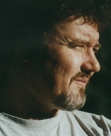David Antrobus's Blog: The Migrant Type, page 33
April 4, 2012
The End of the World Playlist
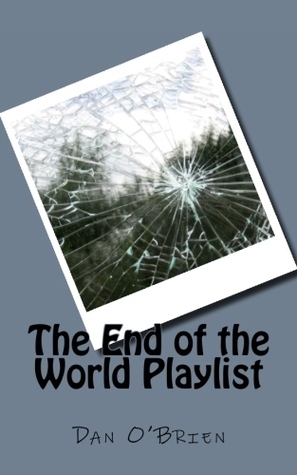 At first glance, Dan O'Brien's The End of the World Playlist is yet another short, sharp, vicious zombie tale packed with everything you expect from the genre; perhaps short on depth, but a fun carnival ride of post-apocalyptic gore. Yet look closer and there's more. There's plenty of slick and frankly hilarious dialogue, for example, fleshing out (sorry) characters who also reveal more depth than initial impressions might suggest. Which is essential, because the reader needs to feel empathy for the handful of human characters up against an increasingly frantic and numerous undead horde they've previously coexisted with, albeit anxiously.
At first glance, Dan O'Brien's The End of the World Playlist is yet another short, sharp, vicious zombie tale packed with everything you expect from the genre; perhaps short on depth, but a fun carnival ride of post-apocalyptic gore. Yet look closer and there's more. There's plenty of slick and frankly hilarious dialogue, for example, fleshing out (sorry) characters who also reveal more depth than initial impressions might suggest. Which is essential, because the reader needs to feel empathy for the handful of human characters up against an increasingly frantic and numerous undead horde they've previously coexisted with, albeit anxiously.
As a huge music fan, I have to confess to being disappointed in the cursory nod this novella gives toward the title. I am admittedly being quite literal, but it's alluded to fairly early on then pretty much abandoned as a concept thereafter, which feels like a missed opportunity to tie this fast-paced story into a potentially rewarding conceptual framework. But that's a small quibble. The story moves fast, as do these zombies (yes, the slow/fast zombie dichotomy is once again highlighted by the speed of these dead folks, which I only mention as a warning to those purists who oppose this more recent, accelerated branch of the mythology). O'Brien provides just enough detail to allow the reader to care for the handful of well-drawn characters before unleashing the inevitable mayhem. The rare moments of reflection, flashes of what we've lost, mere sparks in a dark cellar, are all the more poignant for that.
Minor kudos and criticism aside, this is above all a well-written, fun(ny) and engaging novella with (it's becoming increasingly important to note) less of the editing issues of many independently published contributions to this overcrowded genre.
More 3 and a half stars, really, but that's not a bad thing. I'd read more of this type of stuff from O'Brien.
March 29, 2012
Entitled
 Oh my god, okay, so there's this thing, right? Did you hear? There are these people, just ordinary people like you and me except they got lucky because there's this revolution going on and people are bulldozing the libraries all across America right now and taking apart those Barns'n'No-Bull stores or whatever they're called, which is, ha, funny, because it's like that saying about locking the barn door after… anyway, I gotta tell you this, it's so cool, and you'll never believe it, but back to these lucky folks, one of them is called Joe Konehead and there's even this really young chick named Amanda Hawking (I think she's the little sister of that handicapped spacegeek with the creepy computer voice), and they heard about this new book revolution, only they're not books, they're eBooks and, oh my god, LOL, this is so amazing, you gotta keep listening. So they made, like, more money than Jesus at a Casino thanks to these iKindles and MaxiPads and all the other eReaders that all these big companies are now making especially for the eBooks, and you know, here's the thing, you can now go sell your eBooks on them since it's so easy, anyone can do it…
Oh my god, okay, so there's this thing, right? Did you hear? There are these people, just ordinary people like you and me except they got lucky because there's this revolution going on and people are bulldozing the libraries all across America right now and taking apart those Barns'n'No-Bull stores or whatever they're called, which is, ha, funny, because it's like that saying about locking the barn door after… anyway, I gotta tell you this, it's so cool, and you'll never believe it, but back to these lucky folks, one of them is called Joe Konehead and there's even this really young chick named Amanda Hawking (I think she's the little sister of that handicapped spacegeek with the creepy computer voice), and they heard about this new book revolution, only they're not books, they're eBooks and, oh my god, LOL, this is so amazing, you gotta keep listening. So they made, like, more money than Jesus at a Casino thanks to these iKindles and MaxiPads and all the other eReaders that all these big companies are now making especially for the eBooks, and you know, here's the thing, you can now go sell your eBooks on them since it's so easy, anyone can do it…
What's that? No, you don't have to be like Walt Shakespeare or even that Dan Vinci & Co dude, you know? Seriously. You don't need to worry about the writing. It's not like your high school English class any more, with all those Mice and Mockingbirds and a bunch of hillbillies with weird names like Spartacus Lynch who sound like totally uncool racists, lol—you know, those classes everyone knew were stupid and wouldn't help you in life in any way what-so-ever. No, it's all done for you in the software, now, and you get it all formatted for you when you upchuck it to Amazon or whatever, or this other website called Crushwords that literally crushes up all your words and spits them out of an actual meat grinder along with a really helpful manual that you honestly don't really need to read, and it's so cool… only you don't actually see it, it's all done behind the scenes… although I don't exactly know how they separate the bits of shredded paper from the ground beef afterward… but moving on…!
What's that? Editing? Nah, Squishwords and Amazon do all that for you, you don't need to bother with it because you'll be busy rounding up new words to join together for your next book because it's all about mo-men-tum and you also have to market it, so what you do is you get someone to help you set up a blog on WordLess.org or Booger.com or whatever and you don't need to do much, just put in one of those blue lines you click on which takes you to where your eBook is selling like hot, juicy, word-drenched cakes as you watch the money pouring into your PlayPen account while you sign books and look awesome and adorable having your photo taken and shit.
By the way, you guys, I like the word eBooks because the "e" part sounds like the noise inside my head, you know? Eeeeeeeeeeee. LOL!
Oh, and here's a big secret I'm gonna tell you, because I'm going to wet my Lululemons if I don't: all you gotta do is write about vampires. Or dragons. And guess what? You shouldn't make them too scary because you have to write for most people, who are all pretty much major wusses, but here's the really neat part… ha, ha… you make them fall in love. Just like it would happen in real life.
 Huh? Story? No, you don't need to worry, every book ever written has basically one story line. Boy meets girl. Boy loses girl. Boy gets girl again. Or here, if you want to be really clever, just reverse the sexes, lol! See? I'm brilliant! Anyway, just follow that formula and give your characters super-awesome names… oh, and find a really bright, sappy cover, don't forget, because you need to be noticed in the marketplace, because since those first lucky folks struck gold, a whole boatload of others have joined the bandwagon… isn't that typical?… and because of that, we have to stand out from the crowd by yelling "buy my book!" louder and louder, and by going to all our friends on Facebook and Twitter and telling them to download our stuff or they're not even our friends really they're just jealous… LOL!… and don't forget to drop into as many groups as you can and tell complete strangers on the internet they better buy your book because it's the only way anyone will notice it otherwise. No, no, they won't get upset, it's called Cap-it-al-ism and we're adjusting to the marketplace. Everyone's doing it.
Huh? Story? No, you don't need to worry, every book ever written has basically one story line. Boy meets girl. Boy loses girl. Boy gets girl again. Or here, if you want to be really clever, just reverse the sexes, lol! See? I'm brilliant! Anyway, just follow that formula and give your characters super-awesome names… oh, and find a really bright, sappy cover, don't forget, because you need to be noticed in the marketplace, because since those first lucky folks struck gold, a whole boatload of others have joined the bandwagon… isn't that typical?… and because of that, we have to stand out from the crowd by yelling "buy my book!" louder and louder, and by going to all our friends on Facebook and Twitter and telling them to download our stuff or they're not even our friends really they're just jealous… LOL!… and don't forget to drop into as many groups as you can and tell complete strangers on the internet they better buy your book because it's the only way anyone will notice it otherwise. No, no, they won't get upset, it's called Cap-it-al-ism and we're adjusting to the marketplace. Everyone's doing it.
Because, see, we're undies, got it? That stands for undependent because we're not dependent on the old record companies any more, that's what I read on Mushable once, that Numbster changed the whole ballgame and now these Random Penguins and Simon Shyster types are wondering what happened while the undie revolution literally killed off all the literary agents and editors after torturing them with horrible mangled grammar and buried them in a warehouse in Brooklyn I think where all the mob bosses go to mourn the death of the Big Six, which is what they call all the old Sicilian families now they've lost the publishing wars. Or, I might have got that slightly wrong, but you get the gist, yeah?
It's a whole new world and we can make our fame and fortune on the internet, better even than Snooks and The Situation because this is post-TV, baby, this is the newest, sparkliest thing.
Ha, all those people ever since high school calling me a bubblehead or a dialtone, you watch me get the last laugh, me an author and everything. 'Cos yeah, I'm not even a writer, I'm gonna be an author, which means I am like the next level of writer, like when you go up a level in that War of the Worldscraft game my little brother plays, ROFL. Hey, wasn't Tom Cruise in that movie? Anyway, you can eat my dust, Tom loser Cruise because I am going to set up my tent right there on the red carpet and the paparazzi will be begging me for upskirts of my sparkly vajayjay but I'm no headshaving wackjob like Brit became and they won't ever get them, just the promise of them, because the secret is to milk it, and this chick's fame is gonna last a lot longer than some stupid 15 minutes like that tennis player Andy Warthog used to say. I mean, think about it. Writers… sorry, authors…stay famous way longer than movie stars, even. Shakespeare, who I already mentioned, has been well known now for well over a hundred years, going back even before DiCaprio was born! Think about that! Ohmygod, ohmygod, so excited! *Claps enthusiastically*
* * * * *
A version of this post appeared on Indies Unlimited on March 23, 2010
March 24, 2012
Mr. Glamour Review
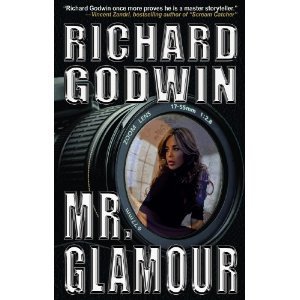 Having also read Richard Godwin's Apostle Rising very recently, I arrived at the soon-to-be-released Mr. Glamour in what I term the "Godwin mindset"; essentially, primed for a police procedural with significant elements of fairly graphic psychological and visceral horror. I wasn't disappointed.
Having also read Richard Godwin's Apostle Rising very recently, I arrived at the soon-to-be-released Mr. Glamour in what I term the "Godwin mindset"; essentially, primed for a police procedural with significant elements of fairly graphic psychological and visceral horror. I wasn't disappointed.
First, though, allow me to dispense with a couple of negatives: the brave new world of independent authors is plagued with what I consider shoddy or inadequate presentation, whereby simple formatting and proofreading, let alone deeper line editing and grammatical issues, are either given a cursory glance or dispensed with altogether. Unfortunately, independent publishers can also find themselves beset with similar problems. While Mr. Glamour improves on Apostle Rising in that regard (in the latter, a pub named The Crooked Key inexplicably becomes The Crooked Fork in one scene), there still remain those irritating typos and misused homophones (cheap/cheep, horde/hoard) that take you immediately out of the narrative. While these issues are not the train wreck endemic to a significant percentage of indie authors, they remain a distraction, albeit one significantly improved upon in the interim between Godwin's two novels.
So, the even better news? Godwin's writing has grown tighter. Don't get me wrong; I enjoyed Apostle Rising, but there were a few flabby sections and the occasional lack of focus. In truth, the novel could have been shorter. Not so Mr. Glamour—which, in it's way, is every bit as nasty and sadistic as its predecessor, yet more honed, with much of the fat sliced away. Godwin has sharpened his storytelling edges from those of a well-stropped straight razor to something more akin to the fabled samurai sword that can slice a human hair lengthways. Perhaps that is overselling it, but the relentlessness of the narrative has improved markedly from something that was very good in the first place. At this rate, Godwin has a Silence of the Lambs in him.
Sharing the male/female dynamic of the cop team with his debut, Mr. Glamour takes more twists and turns with the psychology of the killer this time. And not only the killer: these particular examples of the law enforcement side of the equation—Flare and Steele in place of Castle and Stone (could there be a message or clue in their very names?)—are themselves every bit as nuanced and flawed as their adversaries. Okay, perhaps not quite as flawed, but still...
I mentioned sadism earlier, which in the context of such novels is by no means a negative criticism; and this particular sadism is earned every step of the way by the twisted pathology of the antagonist. While not dwelling so long on the scenes of literal torture this time around, Godwin has managed to make that leap to the less-is-more school of horror. Again, he doesn't flinch, but he also refuses to leave the camera running throughout, so to speak. Yet the horror doesn't suffer one bit. No, the victims suffer, and so do we the readers, as we find ourselves inside their tomented heads more often.
In short, Godwin has once more created a seamless hybrid of crime and horror novel while retaining some of the dark lyricism, ramping up the atrocities, and tightening both the noose and the narrative, an altogether impressive achievement.
March 23, 2012
The Book Was Better
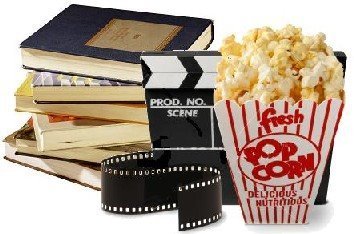 "I just saw the movie, wasn't a patch on the book."
"I just saw the movie, wasn't a patch on the book."
If I'd stuffed my face with a deep-fried Mars bar every time I heard this sentiment, I'd probably lose a weigh-in with an elephant seal, have a mouthful of teeth with the average consistency of a sea sponge, and skin the overall texture of pepperoni by now. I'll bet every last one of us has said something similar, though. Which makes every last one of us a bit weird, really. Not quite stupid, but getting there, you know?
Let me explain my thinking. (I find I have to do that a lot, which says nothing good about me whatsoever.)
It's actually quite simple. A book is a book. A movie is a movie. And Popeye is what he is… an extremely odd-shaped sailor with a fetish for canned green vegetables.
Seriously, though, "the book was better" has become one of those irksome knee-jerk phrases that are stand-ins for something else entirely. See: "it's political correctness gone mad!" which actually means "damn, the world doesn't condone my bigotry any more, so I'll just have this here tantrum instead". Or: "I knew them before they were famous" which translates as "I am an unctuous hipster and will drip oily, corrosive scorn on, you know, like, everyone not in the inner circle of me, dude."
But what do we really mean when we utter this phrase? In a mundane sense, I suppose we mean "this apple is better than this orange", but if we already prefer apples to oranges, it doesn't really bear repeating, does it? We could just make that clear once and be done with it: "I am an apple/book person. Not an orange/film person". End of story. No, I think what is happening is similar to when people say "oh, TV, I don't bother watching that stuff any more"—a whole slew of assumptions lie barely hidden beneath the surface, not least of which is that certain media are adjudged inferior. My point isn't to argue whether or not they are, but to lament the smugness of the assumption itself, as if our audience will automatically nod vigorously in agreement every single time.
The complicating factor, I suppose, and one that exposes my metaphor for the flawed and incomplete thing it really is, is that this orange is based on that apple in some elusive way. Which shouldn't matter—it's still a freaking orange!—yet somehow, to most of us, it does. Why? Are we incorporating a little of the knew-them-before-they-were-famous hipster vibe alongside an assumption that books are inherently superior to movies? Is it because, even after just over a century, movies are still the upstarts? Are we making that hallowed mistake every generation makes, by deploring the newest and latest medium (whether it be jazz, rock'n'roll, comic books, hip-hop or video games, whatever "the kids" are into) in favour of what we are comfortable with? Whatever it is, I wish we'd stop it. It's starting to sound like the jerking of ancient knees, a particularly alarming mix of rubbery creak and twangy groan that makes my stomach feel weird. So yeah, stop it. Please?
Okay, look. There are many novels that have been adapted for film for which any qualitative choice is difficult if not impossible. Let me say it again: a movie is not a book and a book is not a movie. One is pretty much entirely text-based and requires the audience to use imagination and comprehension, whereas the other is almost entirely visual and auditory and requires a little of the same two qualities plus something more elusive. One takes eight or nine hours to ingest, while the other takes around two hours. One is largely a solo project; the other a massive team effort. They are both extremely complex in different ways. Sure, they are related, in that they contain narrative arcs and characters and themes and such things, but they are still very different. Just as a movie and a video game are different. Yes, there are convergences, but overall it makes little sense to judge them by the same metrics.
Anyway, because my OCD side loves lists, I am now going to fire off a random group of 30 books, in no particular order, which weren't better than their movie counterparts, but were simply different. Not better, not worse, different. Like apples. Like oranges. Like Popeye. Like deep-fried Mars bars. Okay, those last things are bad.
1. Charlie and the Chocolate Factory by Roald Dahl (renamed Willy Wonka and the Chocolate Factory in the original movie adaptation).
2. The Body by Stephen King (renamed Stand By Me in Rob Reiner's film version)
3. The Shining by Stephen King
4. 2001: A Space Odyssey by Isaac Asimov
5. Do Androids Dream of Electric Sheep? by Philip K. Dick (renamed Blade Runner in Ridley Scott's classic film)
6. Trainspotting by Irvine Welsh
7. The Big Sleep by Raymond Chandler
8. Psycho by Robert Bloch
9. Atonement by Ian McEwan
10. The Lord of the Rings by J.R.R. Tolkien (combine Peter Jackson's trilogy for the comparison)
11. Mystic River by Dennis Lehane
12. To Kill a Mockingbird by Harper Lee
13. A Clockwork Orange by Anthony Burgess
14. One Flew Over The Cuckoo's Nest by Ken Kesey
15. On the Beach by Nevil Shute
16. Deliverance by James Dickey
17. The Grapes of Wrath by John Steinbeck
18. The Silence of the Lambs by Thomas Harris
19. Children of Men by P.D. James
20. Misery by Stephen King
21. No Country For Old Men by Cormac McCarthy
22. Wuthering Heights by Emily Brontë (the best film being the 1939 version)
23. The World According to Garp by John Irving
24. The Godfather by Mario Puzo
25. The Dead by James Joyce
26. Fight Club by Chuck Palahniuk
27. The Hours by Michael Cunningham
28. Wonder Boys by Michael Chabon
29. American Psycho by Bret Easton Ellis
30. The Name of the Rose by Umberto Eco
Note the mix of classic lit, contemporary lit and genre fiction… No real reason, just note it… Okay, I admit it, I was going to make a great point there and completely forgot what it was. Cough. Moving on… Unlike the occasional glaring piece of wrongness, such as The Bonfire of the Vanities or Moby Dick, not one of these film versions is significantly inferior, or even inferior at all, some being arguably superior. Certainly my point stands that you can make a case for either incarnation. An argument can also be made, based on a closer study of these successes, perhaps, that a film—recognizing itself as a different animal entirely—may often work better if it doesn't try too hard to replicate the source material.
And now, since I've only included works with which I'm familiar in both mediums, feel free to add, in the comments section below, the many I've overlooked.
* * * * *
A version of this post appeared on Indies Unlimited on March 16, 2012
March 16, 2012
The Horror... The Horror...
"Horror… Horror has a face… and you must make a friend of horror." Colonel Kurtz, Apocalypse Now
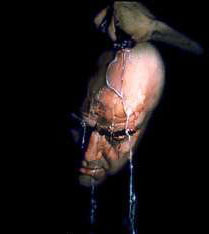 You'd think that horror would be one of the easiest of genres within which to write: create a protagonist who is either extremely likeable or go for the opposite, a character deserving of some particularly overdue and nasty payback; either invent or import a monster from Familiar Horror Trope Land (sparkly or not, preferably the latter); bring them together in some unexpected location and everything gets all squishy and liquidized and unpleasant and the audience members lose all control of their bodily functions and curse your parents… except that's not necessarily what happens at all. Horror is hard to write. Okay, no, I just lied. Horror is easy to write, but good horror is hard to write.
You'd think that horror would be one of the easiest of genres within which to write: create a protagonist who is either extremely likeable or go for the opposite, a character deserving of some particularly overdue and nasty payback; either invent or import a monster from Familiar Horror Trope Land (sparkly or not, preferably the latter); bring them together in some unexpected location and everything gets all squishy and liquidized and unpleasant and the audience members lose all control of their bodily functions and curse your parents… except that's not necessarily what happens at all. Horror is hard to write. Okay, no, I just lied. Horror is easy to write, but good horror is hard to write.
Turns out you end up with a lot more decisions than you thought: do you go with quiet or splatter, traditional or transgressive, supernatural or psychological, gritty realism or more fanciful and fantastic? And that's only the start. There are questions about suspense, how to build it, sustain it, let it go for a while, bring it back shrieking with ropes of blood-flecked drool and sheer malevolence (that's another thing: beware overwriting; horror as a genre is particularly susceptible). Or endings. Tragic endings are more acceptable in horror than in most fiction, obviously, but does your story earn the especially awful nihilism it culminates in? I mean, what on earth did Frank Darabont think he was doing when he gave Stephen Kings "The Mist" that ending? You can't give what is after all a solid pulp B-monster-movie, played for some comic moments, the existential, Kafkaesque, sheer dismal bleakness of that ending. I mean, come on… sorry, got sidetracked there. Ha. And anyway, film is a whole 'nother area outside of our jurisdiction, thankfully. Point being, this shit gets complicated.
It wasn't supposed to be like this. When you picked up your metaphorical Sharpie to write, you were thinking along the lines of something garish, with simple, bold lines, like a Saturday morning cartoon with scares, a largely fun carnival ride of the mind. It's like you thought to yourself, I'll just go watch Wile E Coyote and Roadrunner—how taxing can that be?—but you somehow forgot about the acid you dropped earlier and now the plight of this desolate, skinny canine with the gaunt, desperate face is making you dig your fingers disconcertingly deep into your own face and weep uncontrollably even before he pulls back the ominously creaking arm on that ACME catapult. And then… Every. Single. Horrible. Creak. Sounds. Like. The. Irrevocable. Closing. Of. A. Heavy. Crypt. Door…
But enough of William Shatner's bizarre vocal mannerisms. The point I'm trying to make is that each choice reveals another level or layer, and so on, until you wish you'd never started this horror writing lark and decided to tackle something more simple… like calculus… rendered in Farsi… suspended on an inverted treadmill… over a nest of squirming pit vipers… while balancing a copy of The Collected Works of H.P. Lovecraft on your elbow… while solving a minor border dispute between two irritable Central American states.
So as the great—yet admittedly insane—Colonel Kurtz said, you must make a friend of horror. You must learn its mannerisms, its idiosyncrasies, its rhythms and patterns, winks and nods. Its, ha, heart of darkness (God, I annoy myself sometimes). Do not assume you know what makes it tick until you have read a significant number of the greats: H.P. Lovecraft, Bram Stoker, Mary Shelley, Edgar Allan Poe, Robert Bloch, Ray Bradbury, Helen Fielding, Richard Matheson, Ramsey Campbell, John Farris, Peter Straub, Stephen King, Chelsea Quinn Yarbro, Clive Barker, Poppy Z Brite, Joe R. Lansdale, etc. All joking aside, you need to respect the genre in order to have a chance of writing horror well. Which is not a given. It's no accident the horror genre has been referred to more than once as the red-headed stepchild of genre fiction. But, unless you're out-and-out spoofing it, you need to. That's basically step one.
And this is a mere taster of what you can expect if you're damn fool enough to try your hand at writing horror fiction. Over the next few posts, I'll explore further steps that will lead you to some unexpected places, both in the outside world and in your own increasingly demented head. But let me end here with one particularly notable banana skin. One word: bathos. If you don't know it, look it up and we'll wait for you… *hums the theme music from Top Gun for some odd reason* Done? Okay. Bathos will kill your story, and you will never live down a tale that builds incredible, heart-pounding tension, no matter how deftly or skilfully written, only for the characters to be confronted near the end by—say—a were-hedgehog or a vampire koala. There are some things that will never, ever be frightening. While there may be artistry and prowess in teasing out something disquieting about a bird bath or an old blackboard eraser, for example, you will never squeeze a drop of fear out of a garlic press or a beer coaster. Not even if you make them sparkly.
* * * * *
A version of this post appeared on Indies Unlimited on March 9, 2012
Found Words, Waiting
I was thinking about how writing dovetails with our wider lives, the lives we may lead outside the tiny cramped space in which we sit for hours hunched over a screen that slowly eats the cones and rods from within our dark-shadowed eyes, perhaps even the sanity from behind our knitted brows, lost amid a precarious landscape built from stacked pizza boxes and empty wine bottles and other far less wholesome things. You know… that place outside we call "the world"? I ventured into my corner of it recently (Vancouver, British Columbia) and even there I began to notice the marks and stamps left by other writers. Either that or I'm now so delusionally obsessed with writing I've reached the point of developing a serious pathology.
Vancouver's most acclaimed literary figure was probably Malcolm Lowry, who wrote Under the Volcano here. William Gibson and Douglas Coupland also spring to mind. But I don't really mean that. I'm not so much interested in the indisputably famous and lauded, but more the quieter language moments we sometimes stumble on by accident.
 A case in point is the Fairmont Pacific Rim Hotel in downtown Vancouver. If you are ever in town, it's an otherwise fairly nondescript piece of modern architecture (think steel, concrete and green-tinted glass) at the intersection of Burrard and Cordova, but what makes it remarkable is that a one-line poem wraps around 17 stories of its facade. Written by British artist Liam Gillick, it reads:
A case in point is the Fairmont Pacific Rim Hotel in downtown Vancouver. If you are ever in town, it's an otherwise fairly nondescript piece of modern architecture (think steel, concrete and green-tinted glass) at the intersection of Burrard and Cordova, but what makes it remarkable is that a one-line poem wraps around 17 stories of its facade. Written by British artist Liam Gillick, it reads:
"lying on top of a building the clouds looked no nearer than when I was lying on the street"
Understated and minimalist, its impact undoubtedly dependent upon its being experienced in context, it nevertheless offers a patina of beauty to an otherwise ordinary late winter day in the city; a reminder that language, as abstract as we sometimes suppose, can also be such a visual and visceral thing of the world.
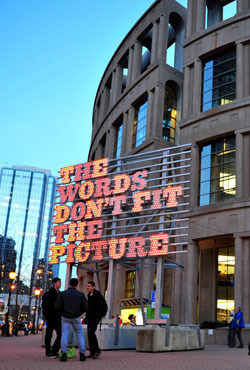 And that isn't all. I found myself at the main central library and once again, even before entering what is frankly a stunning building in its own right, more understated words introduced themselves to me like slightly reticent predators.
And that isn't all. I found myself at the main central library and once again, even before entering what is frankly a stunning building in its own right, more understated words introduced themselves to me like slightly reticent predators.
THE WORDS DON'T FIT THE PICTURE
Which is artist Ron Terada's poetic expression of Vancouver's historic relationship with bright, neon signs. Or as he puts it himself: "The sign takes its cues from an era of signage when signs were seen as celebratory, grand and iconic – in effect, as landmarks in their own right, a kind of symbolic architecture… Taken within the context of a public library, the work touches upon – in a very poetic way – the use of words and language as boundless and imaginative, as a catalyst for a multiplicity of meanings."
And still we weren't done, because inside the breathtaking atrium, there were yet more words, way up on the precipitous walls. Mysterious and, again, quietly poetic words. This time, it required some detective work to discover their source, detective work that hasn't paid off at the time of writing (if my inquiries pay off, I'll add any new information later). Here are those words, in the form of six banners hung beside each other (no idea how to format that here), all upper case text, each six-line block in different but uniform colours:
WITH
MEMORY
OF ALL IT
WOULD
LEAVE
UNDONE
FIRST
THROUGH
FOLLY
AND THEN
NOW BY
ERROR
LIKE A
HOPE
AGAINST
HOPE AND
WHATEVER
ELSE
IT WAS
NOW
THERE
AGAIN TO
BE MADE
REAL
HAVING
BEEN
WRITTEN
AT SOME
PRIOR
POINT
IN THE
FACE OF
ALL IT
COULD
HAVE
BECOME
 Enigmatic and elusive words, somehow sorrowful, regretful. Certainly beautiful. Which could lead to a whole other blog post on how important language is as something beyond mere communication and more like art, but I'll resist as this is getting long.
Enigmatic and elusive words, somehow sorrowful, regretful. Certainly beautiful. Which could lead to a whole other blog post on how important language is as something beyond mere communication and more like art, but I'll resist as this is getting long.
Funnier still, this strange journey through some kind of secret poetic life of my adopted city didn't end there. Retiring to one of my old favourite haunts, a little bar in Gastown, the oldest part of Vancouver, named the Irish Heather, all four bathroom doors were festooned with…. you guessed it…. words. Words written by Samuel Beckett, Shane MacGowan, Sinéad O'Connor and Brendan Behan, the latter of which seemed to encapsulate the day.
"I have a total irreverence
for anything connected
with society,
except that which makes
the roads safer,
the beer stronger,
the food cheaper and
the old men and old women
warmer in the winter and
happier in the summer."
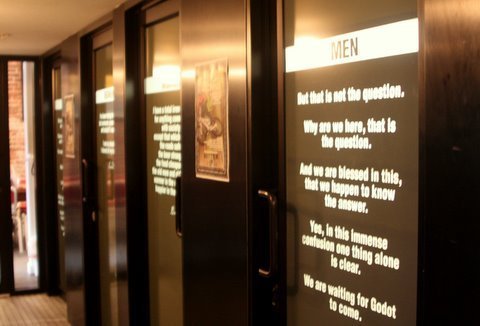
Anyone else know of similar examples in their own cities, where solitary words must compete quietly against the rush of traffic, the roar of floatplanes in the harbour, the blustery cacophony of pigeon wings… and sometimes even triumph?
* * * * *
A version of this post appeared on Indies Unlimited on March 2, 2012
March 9, 2012
What is this Kinship of Which You Speak? Pt. 2
Part Two of a longer post. Part One is here.
__________________________________
Over time, we became street fixtures ourselves, and this is where trouble can start.
First, it is easy to begin to over-identify with the street lifestyle and see the "normal" world as the enemy, as a cold, insouciant planet of hypocrisy-peddlers from manicured suburbs or hostile downtown business owners clearing their precious doorways, customers with wallets relentlessly prioritized over these troublesome urchins.
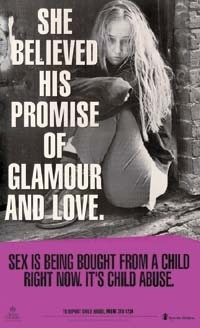 And second, it's even easier to bond with the youth themselves. For all their outward bravado and feral smarts, street kids are still kids, and once they trust you, their loyalty is fierce, as it must be in return if we were to be effective. For they have first survived and often been further hurt by a system that regularly ignores their specific needs, or that judges them unfairly, or that contains workers who once genuinely believed in "helping others" now turned cynical by a job that shackles them to a desk and forces them to fill out endless forms largely designed to protect their supervisors from lawsuits.
And second, it's even easier to bond with the youth themselves. For all their outward bravado and feral smarts, street kids are still kids, and once they trust you, their loyalty is fierce, as it must be in return if we were to be effective. For they have first survived and often been further hurt by a system that regularly ignores their specific needs, or that judges them unfairly, or that contains workers who once genuinely believed in "helping others" now turned cynical by a job that shackles them to a desk and forces them to fill out endless forms largely designed to protect their supervisors from lawsuits.
So when—as happened in my final year in the job—you lose two boys and one girl, all to some dire yet sly breed of violence, you tend to take it badly. And when the system is so broken that I am double-teamed by my own supervisor and a child protection worker and instructed to ignore a local 13-year-old girl—who is right now claiming physical and sexual abuse in another city—for the sole reason that she is now in an adjoining province and therefore no longer "our problem"; while that same week I'm thwarted by numerous drug rehab centres—after an 18-year-old girl finally relents and asks for help for her crack habit—on the grounds that she is too old for the youth facilities and yet won't qualify for the adult detox centres, it can all come to a head very quickly and very starkly. So when that third child, a 14-year-old girl this time, was found hanging in her basement by her 10 year-old brother, I simply walked away. Ostensibly a medical/stress leave, but I knew I wouldn't be going back.
Now, I'm not saying this was entirely the work. There was some stuff of my own I'd been carrying for far too long and which needed lancing before it ended up seriously ruining me—and that's not hyperbole—stuff that would take at least another decade to work through, but basically, I had begun a career which was not sustainable over the long term, and unlike other acknowledged high-stress occupations, there would be no twenty-year pension for me. No gold watch. No one to recall your deeds, heroic or otherwise. Nobody quite spells out to you at the beginning of all this heartache how truly corrosive to your happiness this work can be. No one mentions the eleven-year-old daughter of newly arrived Central American immigrants performing fellatio on a sick old man in the back of a local limousine. Or warns you about the fatal overdose in an alley on "Welfare Wednesday" that won't even make the local newspaper. Or prepares you for the rage of a twelve year old boy with a Christian cross seared into his torso from throat to navel by, presumably, some glowing and righteous cigarettes.
So, now we're at the point where I realised that world was gone from me, perhaps forever. A couple of confirmations by mental health types that I was suffering from Post Traumatic Stress Disorder and clinical depression (wonderful how they always like to hit you with two diagnoses, as if you're not reeling enough) later, and I entered 2001 on antidepressants. Which explains why I felt nothing and to this day remember almost as little of the first half of that year. I think I hiked in the mountains a lot.
 It was some time during the summer that the idea of the road trip occurred to me. It became an idea I couldn't shake, and the combination of an understanding family and conveniently located friends along the potential route from near Vancouver, BC to New York City, made it not only possible but feasible. Late August, and a thought appeared unbidden: "I want to leave on a Tuesday". No idea why now. Could be it was the day my Employment Insurance cheque arrived. But however I arrived at it, "Road Trip" was entered on the calendar next to Tuesday, September 11, and I waited.
It was some time during the summer that the idea of the road trip occurred to me. It became an idea I couldn't shake, and the combination of an understanding family and conveniently located friends along the potential route from near Vancouver, BC to New York City, made it not only possible but feasible. Late August, and a thought appeared unbidden: "I want to leave on a Tuesday". No idea why now. Could be it was the day my Employment Insurance cheque arrived. But however I arrived at it, "Road Trip" was entered on the calendar next to Tuesday, September 11, and I waited.
Monday, September 10, 2001: My bags were packed: camping gear, cassette tapes (yes, my '91 Civic only had a tape deck), clothes to last a few weeks. The drive itself would take at least a week each way unless I drove like something being pursued—not out of the question given the odd fluttery feelings drifting through me like eels through kelp, that might well have been me trying to wean myself from the Celexa—but I would also want to explore as much of New York City as I could, having never visited before. So I was estimating at least three weeks, perhaps as much as a month.
Which brings us to where the story begins. The story in my book. Perhaps many other stories. Those harrowing moments everyone can recall with pinpoint accuracy. For us, it went like this: I woke very early to a beautiful clear dawn. My partner told me something strange was happening, and a certain tone in her voice made me sit up and pay attention. I heard something on the radio that turned out to be inaccurate: "Up to nine planes are currently unaccounted for." We turned on the TV and watched the second plane hit the South Tower. Shortly after, we saw jumpers. I don't think the news people even knew what they were showing at first. We watched the buildings fall. We walked our son to his elementary school. I said "I can't go on my road trip." My partner said "first, find out how your friend in New York is doing". Nobody could phone New York. But I found him online. He said "everyone is leaving, it feels like a war zone. If you can, please still visit." I talked to my partner and watched the TV all day, the appalling endless loop. My son came home from school. I talked to my family and they were okay with me going. In the immediate future, at least, the United States border was closed, so Winnipeg became my new destination. I left late afternoon and barely even recall the eight hour drive that found me in Canmore, Alberta by midnight.
I know this was a familiar media refrain, but it felt like everything had utterly and irrevocably changed and would never go back to what it had been. And that the potential for that to be a good thing hung in the deceptively still Rocky Mountain air that night the world inhaled and awaited its next breath.
So, the kinship of which I speak? It's us. Ours. To make of it what we will.
March 8, 2012
What is this Kinship of Which You Speak? Pt. 1
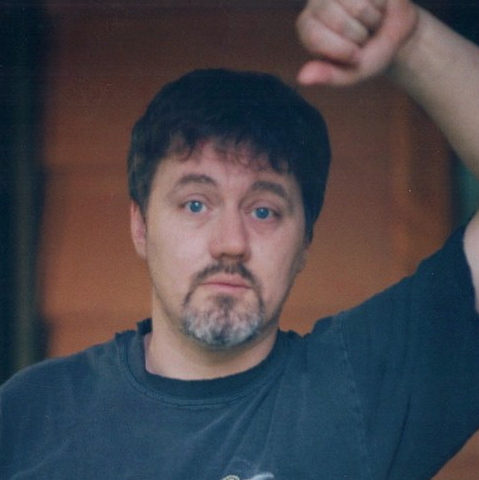 It occurred to me recently, in one of those sudden, sobering facepalm moments, that here I have this blog all dedicated to writing and everything, and yet almost twenty posts and three months in, I have yet to revisit the book I mentioned in my opening post. In other words, my own book. In other words, I'm a bit of an idiot.
It occurred to me recently, in one of those sudden, sobering facepalm moments, that here I have this blog all dedicated to writing and everything, and yet almost twenty posts and three months in, I have yet to revisit the book I mentioned in my opening post. In other words, my own book. In other words, I'm a bit of an idiot.
The thing is, it's actually hard for me to talk about my book. As I mentioned back then, I am currently working on its sequel, but the entire decade-long episode surrounds a kernel of such genuine pain that I rarely express or even visit it. In fact, you can see it in my face in the embedded photo (wow, where does the time go?). The sequel itself is not going particularly well, either, for slightly different reasons. In fact, personal and darkly precious as they are—black pearls formed around gritty irritants—a part of me will be very relieved to get these two books behind me, so I can concentrate on lighter fare... such as disturbing, transgressive and/or graphic horror fiction. Yeah, I know, that sounds like a joke, but it's actually not.
I don't mean those books are bad. Not at all. I think Dissolute Kinship is a very decent short book, in fact, and I have every reason to believe its follow-up will be equally good, albeit a tad less redemptive. It's just that I've lived them now and they feel a little like millstones... like the haunted past... and I now want to escape some of the darkness and breathe a little.
So let me try to explain why I was in the predicament in the first place. I once worked with damaged kids. When I say damaged, I suppose I mean "abused and neglected and marginalized youth", in the jargony parlance of our official mandate. These are inadequate and even glib terms when describing lives that have barely gotten off the ground, lives that have only just woken from the sleep that comes before life and have already found themselves blighted by some of the worst afflictions of the human condition: addiction, poverty, cruelty, sexual predation, the vast indifference of the wider world.
My job on the streets was to be available to the kids who haunted the arcades and alleyways in case they needed and (more crucially) asked for services, and to advocate relentlessly for them once they did. I've never felt such a weighty responsibility. We would wrestle with the "system" (loosely, the government agencies centred around social services, education, law enforcement, etc.) and sometimes provide the voice for an individual child that pain or anger had silenced, however temporarily.
The youth on the street knew we were there, knew what we offered, and by no means did all of them access our services. But they knew. Which was sometimes enough. We were safe adults, usually predictable in our movements (deliberately so) and they knew where to find us. Even if it was to hit us up for a couple quarters to play Mortal Kombat.
Over time, we became street fixtures ourselves, and this is where trouble can start.
_____________________
Okay, this is getting too long for a single blog post, so I'm going to split it into two parts.
March 5, 2012
Smashwords Read An Ebook Week
My book is available for free as part of the Smashwords Read An Ebook Week promotion, as from now until March 10. To download a copy, go here, and fill your boots.

March 2, 2012
Ten Endings
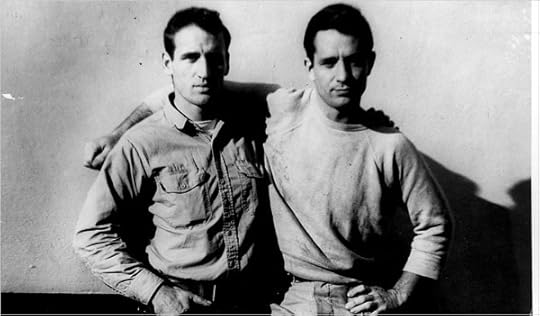 I want to talk about endings. How important they are, obviously; but more because I simply want to share some of my favourites. A lazy post, in a way, but perhaps a fun or enjoyable one. I love a well-crafted passage of writing, wherever it occurs in a book, and most who love language would probably concur. Yet more satisfying and occasionally beautiful still are those final lines of a novel that both summon and summarize the themes and rhythms of the entire narrative in a handful of incredibly wrought, startling, sorrowful exquisite, elegiac sentences.
I want to talk about endings. How important they are, obviously; but more because I simply want to share some of my favourites. A lazy post, in a way, but perhaps a fun or enjoyable one. I love a well-crafted passage of writing, wherever it occurs in a book, and most who love language would probably concur. Yet more satisfying and occasionally beautiful still are those final lines of a novel that both summon and summarize the themes and rhythms of the entire narrative in a handful of incredibly wrought, startling, sorrowful exquisite, elegiac sentences.
Some quotes stand alone, gorgeous synecdoches; others require the full context of the preceding novel. No matter. Beauty is beauty, and in my own writing I use these as perhaps unattainable benchmarks for how I want my language to develop and move throughout a piece. I say unattainable, because for me a sublime failure is still more interesting than a bland success. If I had written anything even approaching the brilliance of any of these, I might just retire happy… or not. Yeah, probably not. I offer these without commentary or void even of my usual lame attempts at humour. Savour them and please add your own favourites in the comments section.
(It ought to go without saying, really, but here there be spoilers!)
1. "Don't ever tell anybody anything. If you do, you start missing everybody." — J.D. Salinger, The Catcher in the Rye
2. "Then there are more and more endings: the sixth, the 53rd, the 131st, the 9,435th ending, endings going faster and faster, more and more endings, faster and faster until this book is having 186,000 endings per second." — Richard Brautigan, A Confederate General from Big Sur
3. "Everything had gone right with me since he had died, but how I wished there existed someone to whom I could say that I was sorry." — Graham Greene, The Quiet American
4. "We were alone with the quiet day, and his little heart, dispossessed, had stopped." — Henry James, The Turn of the Screw
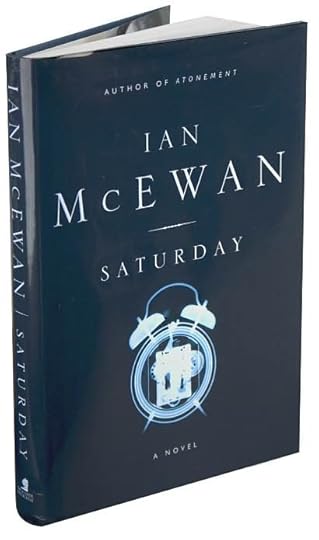 5. "He fits himself around her, her silk pyjamas, her scent, her warmth, her beloved form, and draws closer to her. Blindly, he kisses her nape. There's always this, is one of his remaining thoughts. And then: there's only this. And at last, faintly, falling: this day's over." — Ian McEwan, Saturday
5. "He fits himself around her, her silk pyjamas, her scent, her warmth, her beloved form, and draws closer to her. Blindly, he kisses her nape. There's always this, is one of his remaining thoughts. And then: there's only this. And at last, faintly, falling: this day's over." — Ian McEwan, Saturday
6. "Listen. Slide the weight from your shoulders and move forward. You are afraid you might forget, but you never will. You will forgive and remember. Think of the vine that curls from the small square plot that was once my heart. That is the only marker you need. Move on. Walk forward into the light." — Barbara Kingsolver, The Poisonwood Bible
7. "So in America when the sun goes down and I sit on the old broken-down river pier watching the long, long skies over New Jersey and sense all that raw land that rolls in one unbelievable huge bulge over to the West Coast, and all that road going, all the people dreaming in the immensity of it, and in Iowa I know by now the children must be crying in the land where they let the children cry, and tonight the stars'll be out, and don't you know that God is Pooh Bear? the evening star must be drooping and shedding her sparkler dims on the prairie, which is just before the coming of complete night that blesses the earth, darkens all rivers, cups the peaks and folds the final shore in, and nobody, nobody knows what's going to happen to anybody besides the forlorn rags of growing old, I think of Dean Moriarty, I even think of Old Dean Moriarty the father we never found, I think of Dean Moriarty." — Jack Kerouac, On The Road
8. "I lingered round them, under that benign sky; watched the moths fluttering among the heath, and hare-bells; listened to the soft wind breathing through the grass; and wondered how anyone could ever imagine unquiet slumbers for the sleepers in that quiet earth." — Emily Brontë, Wuthering Heights
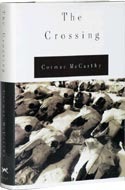 9. "Hill House itself, not sane, stood by itself against its hills, holding darkness within; it had stood so for eighty years and might stand for eighty more. Within, walls continued upright, bricks met neatly, floors were firm, and doors were sensibly shut; silence lay steadily against the wood and stone of Hill House, and whatever walked there, walked alone." — Shirley Jackson, The Haunting of Hill House
9. "Hill House itself, not sane, stood by itself against its hills, holding darkness within; it had stood so for eighty years and might stand for eighty more. Within, walls continued upright, bricks met neatly, floors were firm, and doors were sensibly shut; silence lay steadily against the wood and stone of Hill House, and whatever walked there, walked alone." — Shirley Jackson, The Haunting of Hill House
10. "It had ceased raining in the night and he walked out on the road and called for the dog. He called and called. Standing in that inexplicable darkness. Where there was no sound anywhere save only the wind. After a while he sat in the road. He took off his hat and placed it on the tarmac before him and he bowed his head and held his face in his hands and wept. He sat there for a long time and after a while the east did gray and after a while the right and godmade sun did rise, once again, for all and without distinction." — Cormac McCarthy, The Crossing
* * * * *
A version of this post appeared on Indies Unlimited on February 24, 2012

